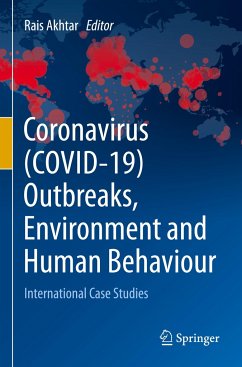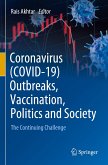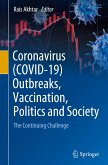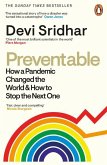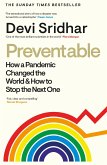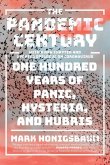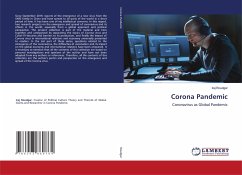Coronavirus (COVID-19) Outbreaks, Environment and Human Behaviour
International Case Studies
Herausgegeben:Akhtar, Rais
Coronavirus (COVID-19) Outbreaks, Environment and Human Behaviour
International Case Studies
Herausgegeben:Akhtar, Rais
- Broschiertes Buch
- Merkliste
- Auf die Merkliste
- Bewerten Bewerten
- Teilen
- Produkt teilen
- Produkterinnerung
- Produkterinnerung
This book covers over 24 country studies on various dimensions associated with the geographical spread of COVID-19. The chapters in the book, from geographically diversified countries, assert the need to undertake intensive regional research in order to understand the global pattern of Coronavirus focusing on infection migration, and indigenous origin that has caused tremendous global economic, social and health disaster. The book contends that understanding of peoples' behaviour is crucial towards safety measures against infection, as COVID-19 impacted to a greater extent social wellbeing of…mehr
Andere Kunden interessierten sich auch für
![Coronavirus (COVID-19) Outbreaks, Vaccination, Politics and Society Coronavirus (COVID-19) Outbreaks, Vaccination, Politics and Society]() Coronavirus (COVID-19) Outbreaks, Vaccination, Politics and Society77,99 €
Coronavirus (COVID-19) Outbreaks, Vaccination, Politics and Society77,99 €![Coronavirus (COVID-19) Outbreaks, Vaccination, Politics and Society Coronavirus (COVID-19) Outbreaks, Vaccination, Politics and Society]() Coronavirus (COVID-19) Outbreaks, Vaccination, Politics and Society75,99 €
Coronavirus (COVID-19) Outbreaks, Vaccination, Politics and Society75,99 €![Preventable Preventable]() Devi SridharPreventable11,99 €
Devi SridharPreventable11,99 €![Preventable Preventable]() Devi SridharPreventable16,99 €
Devi SridharPreventable16,99 €![Pflegerische Versorgung bei COVID-19 in der Langzeitpflege Pflegerische Versorgung bei COVID-19 in der Langzeitpflege]() Sabine HindrichsPflegerische Versorgung bei COVID-19 in der Langzeitpflege36,90 €
Sabine HindrichsPflegerische Versorgung bei COVID-19 in der Langzeitpflege36,90 €![The Pandemic Century: One Hundred Years of Panic, Hysteria, and Hubris The Pandemic Century: One Hundred Years of Panic, Hysteria, and Hubris]() Mark HonigsbaumThe Pandemic Century: One Hundred Years of Panic, Hysteria, and Hubris12,99 €
Mark HonigsbaumThe Pandemic Century: One Hundred Years of Panic, Hysteria, and Hubris12,99 €![Corona Pandemic Corona Pandemic]() Iraj RoudgarCorona Pandemic36,99 €
Iraj RoudgarCorona Pandemic36,99 €-
-
-
This book covers over 24 country studies on various dimensions associated with the geographical spread of COVID-19. The chapters in the book, from geographically diversified countries, assert the need to undertake intensive regional research in order to understand the global pattern of Coronavirus focusing on infection migration, and indigenous origin that has caused tremendous global economic, social and health disaster. The book contends that understanding of peoples' behaviour is crucial towards safety measures against infection, as COVID-19 impacted to a greater extent social wellbeing of population because of lockdowns in all corners of the world.
Some of the countries featured are USA, France, Italy, Hong Kong, South Korea, Canada, Australia, Pacific Islands, Russia, Taiwan, Thailand, Malaysia, Indonesia, India, South Africa, Nigeria, Mexico, Peru and Brazil.
Some of the countries featured are USA, France, Italy, Hong Kong, South Korea, Canada, Australia, Pacific Islands, Russia, Taiwan, Thailand, Malaysia, Indonesia, India, South Africa, Nigeria, Mexico, Peru and Brazil.
Produktdetails
- Produktdetails
- Verlag: Springer / Springer International Publishing / Springer, Berlin
- Artikelnr. des Verlages: 978-3-030-68122-7
- 1st edition 2021
- Seitenzahl: 504
- Erscheinungstermin: 23. April 2022
- Englisch
- Abmessung: 235mm x 155mm x 28mm
- Gewicht: 756g
- ISBN-13: 9783030681227
- ISBN-10: 303068122X
- Artikelnr.: 63664324
- Herstellerkennzeichnung Die Herstellerinformationen sind derzeit nicht verfügbar.
- Verlag: Springer / Springer International Publishing / Springer, Berlin
- Artikelnr. des Verlages: 978-3-030-68122-7
- 1st edition 2021
- Seitenzahl: 504
- Erscheinungstermin: 23. April 2022
- Englisch
- Abmessung: 235mm x 155mm x 28mm
- Gewicht: 756g
- ISBN-13: 9783030681227
- ISBN-10: 303068122X
- Artikelnr.: 63664324
- Herstellerkennzeichnung Die Herstellerinformationen sind derzeit nicht verfügbar.
Prof. Rais Akhtar is Adjunct Faculty and CO-P.I. on the Department of Science and Technology (Government of India) Project on climate change and health, at the International Institute of Health Management and Research, New Delhi. He has published more than 18 books and numerous articles on medical geography and climate change and health. Prof. Akhtar delivered lectures at a number of medical institutes including the London School of Hygiene and Tropical Medicine, Liverpool School of Tropical Medicine, Liverpool School of Tropical Medicine, Johns' Hopkins University School of Public Health and the Institute of Public Health, University of Pisa. He has also received numerous international fellowships, including Leverhulme and Henry Chapman fellowships of the University of Liverpool and the University of London, respectively, and the Visiting Professor, University of Paris, Nanterre. Prof. Rais Akhtar was elected Fellow of Royal Geographical Society, London, and Royal Academy of Overseas Sciences, Brussels. Prof. Akhtar was the lead author of the UN Intergovernmental Panel on Climate Change (IPCC). Prof. Akhtar received Nobel Prize Memento after IPCC shared the Nobel Peace Prize with Al Gore in 2007.
Section I Introductory.- Chapter 1: Coronavirus, Environment and Human Behaviour.- Chapter 2: Coping During Covid-19 Public Health Crisis.- Section II Australasia.- 3.Epidemiological history and the COVID-19 outbreak in the Pacific Islands - Does knowledge of the history help to fight epidemics?.- 4.Public health policy responses and human behavioural adaptations to COVID-19 in Taiwan.- 5.Healthcare resources in the context of COVID-19 outbreak-Thailand, 2020.- 6.How Malaysia counters coronavirus disease 2019 (COVID-19): Challenges and Recommendations.- 7.COVID-19 in Indonesia:Geoecology and People's Behaviour.- 8.Does socioeconomic status matter? A Study on the Spatial Patterns of COVID-19 in South Korea and Hong Kong..- 9.Changing lives of migrants in post- covid period: A study of mobile vendors in Mumbai.- 10.Beating back COVID-19 in Mumbai, India.- 11.COVID-19: the Australian experience.- Section III Europe, Russia.- 12.Coronavirus (COVID-19): the revenche of the countryside in France.- 13.COVID-19 in Italy: Health, socio- economic consequences and relationship with the European Union.- 14.COVID-19 Epidemia in Italy Has Association with Air Pollution.- 15.United Kingdom: An anatomy of a public policy failure.- 16.COVID-19 spread in the Iberian Peninsula: The influence of socioeconomic conditions.- 17.COVID- 19 in Russia: the distribution and medical geographical modelling.- Covid-19 in South Africa: A Crisis on a Crisis on a crisis.- 19.Geographical Dynamics of COVID-19 in Nigeria.- Section IV Americas.- 20.COVID-19 in Mexico: Differentiated Impacts in Territories and Income Groups.- 21.Expansion of the Disease by Coronavirus(COVID-19) in Argentina:Social,Economic and Environmental Implications in the Country.- 22.Outlining regional scenarios during the Coronavirus pandemic in Brazil.- 23.Novel Coronavirus (COVID-19) infection in Perú: Geographical Distribution, Economic Impact and Vulnerable Populations .- 24.The Spread of COVID-19 in Canada and its Environmental and Economic Impacts.- 25.Public Health Crisis Health disparities: health equity and COVID-19 Pandemic in USA.- 26. Geographic Patterns of the Pandemic in the Pandemic in the United States: Covid-19 Response Within a Disunified Federal System.- 27.Conclusion & Suggestions.
Section I Introductory.- Chapter 1: Coronavirus, Environment and Human Behaviour.- Chapter 2: Coping During Covid-19 Public Health Crisis.- Section II Australasia.- 3.Epidemiological history and the COVID-19 outbreak in the Pacific Islands - Does knowledge of the history help to fight epidemics?.- 4.Public health policy responses and human behavioural adaptations to COVID-19 in Taiwan.- 5.Healthcare resources in the context of COVID-19 outbreak-Thailand, 2020.- 6.How Malaysia counters coronavirus disease 2019 (COVID-19): Challenges and Recommendations.- 7.COVID-19 in Indonesia:Geoecology and People's Behaviour.- 8.Does socioeconomic status matter? A Study on the Spatial Patterns of COVID-19 in South Korea and Hong Kong..- 9.Changing lives of migrants in post- covid period: A study of mobile vendors in Mumbai.- 10.Beating back COVID-19 in Mumbai, India.- 11.COVID-19: the Australian experience.- Section III Europe, Russia.- 12.Coronavirus (COVID-19): the revenche of the countryside in France.- 13.COVID-19 in Italy: Health, socio- economic consequences and relationship with the European Union.- 14.COVID-19 Epidemia in Italy Has Association with Air Pollution.- 15.United Kingdom: An anatomy of a public policy failure.- 16.COVID-19 spread in the Iberian Peninsula: The influence of socioeconomic conditions.- 17.COVID- 19 in Russia: the distribution and medical geographical modelling.- Covid-19 in South Africa: A Crisis on a Crisis on a crisis.- 19.Geographical Dynamics of COVID-19 in Nigeria.- Section IV Americas.- 20.COVID-19 in Mexico: Differentiated Impacts in Territories and Income Groups.- 21.Expansion of the Disease by Coronavirus(COVID-19) in Argentina:Social,Economic and Environmental Implications in the Country.- 22.Outlining regional scenarios during the Coronavirus pandemic in Brazil.- 23.Novel Coronavirus (COVID-19) infection in Perú: Geographical Distribution, Economic Impact and Vulnerable Populations .- 24.The Spread of COVID-19 in Canada and its Environmental and Economic Impacts.- 25.Public Health Crisis Health disparities: health equity and COVID-19 Pandemic in USA.- 26. Geographic Patterns of the Pandemic in the Pandemic in the United States: Covid-19 Response Within a Disunified Federal System.- 27.Conclusion & Suggestions.

